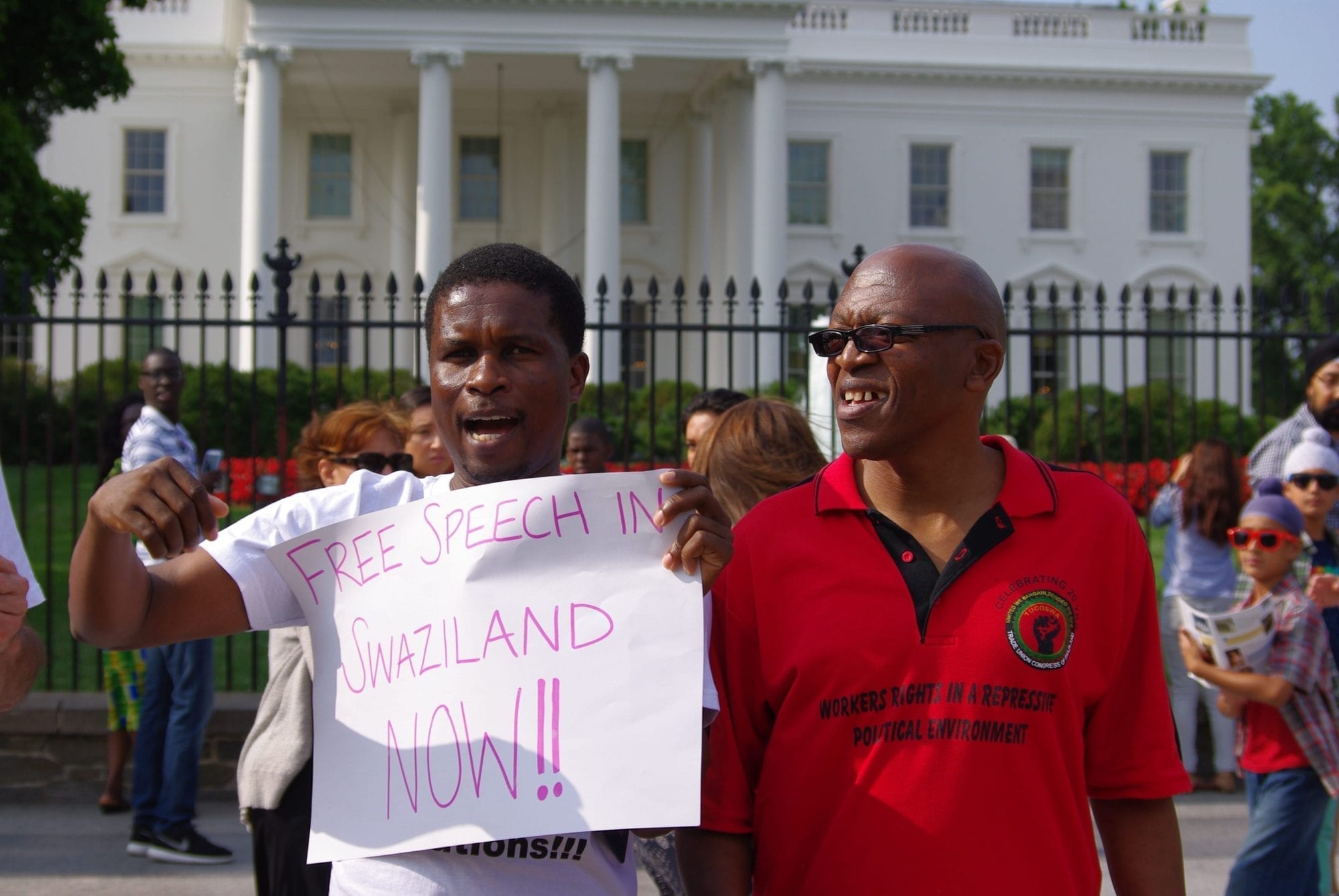Aug 12, 2014

Solidarity Center Africa Regional Program Director Imani Countess Credit: Tula Connell
The U.S.-Africa Summit in Washington, D.C., last week stood apart from similar trade and investment meetings held by China or by the European Union because African union leaders, representing millions of working people, made their voices heard, said Imani Countess, Solidarity Center regional program director for Africa.
“Any U.S. conversation discussing economic development, trade and investment in Africa couldn’t happen without … people understanding how foundational decent work, labor rights … are to overall growth and economic development,” Countess said, speaking on RadioLabour.
The Solidarity Center and the AFL-CIO facilitated meetings, held in tandem with the U.S.-Africa Summit, that included nearly 40 union leaders from 11 countries to highlight the need for good jobs as a priority in trade and investment decisions.
“As one is looking at promoting investment in Africa, that investment has to be pro-employment, as opposed to the continued emphasis and support for growth that is benefiting a very small minority,” Countess said.
Listen to the full interview.
Aug 11, 2014

Joel Odigie says poverty and inequality are worsening in Africa, despite the continent’s economic growth.
“Africa rising” was the catchphrase buzzing around Washington, D.C., last week, as African heads of state met for a three-day summit with U.S. government and private business.
But Joel Odigie, coordinator of human and trade union rights for the International Trade Union Confederation-Africa, says working people are not benefiting from the continent’s economic growth.
“In reality, there is an economic growth in Africa that is for the 1 percent. Poverty continues to increase, inequality continues to widen,” he said,” speaking on RadioLabour. “The question of investment and trade should be the issues of how we are able to use that to address some of these concerns.”
Odigie was among 40 African union leaders meeting in Washington, D.C., to highlight the need for decent work—which includes good wages, safe working conditions and the freedom to form unions and collectively bargain—gender equality and human rights.
Listen to the full interview
Aug 8, 2014

Kwasi Adu-Amankwah, ITUC-Africa general-secretary, highlighted the need for jobs and worker rights this week in Washington, D.C. Credit: RadioLabour
During this week’s U.S.-Africa Summit with heads of state in Washington, D.C., more than 40 African trade union leaders took part in parallel meetings to call on U.S. and African leaders to adopt a decent work agenda for trade and economic growth.
In interview with RadioLabour, Kwasi Adu-Amankwah, general-secretary of the International Trade Union Confederation-Africa, discussed the focus on decent work
“Decent work … refers to the need for employment, but when people are employed, they have to have rights,” Adu-Amankwah said.
“Employment is one pillar of decent work, and the existence of worker rights also is another pillar,” Adu-Amankwah said, citing social protection as the third part of a decent work agenda.
“Then there is a question of social dialogue—when people are at work, they must have rights to speak out. So they must be able to organize and to bargain collectively.”
Adu-Anamkwah also spoke at the official Africa Summit civil-society side event, “Promoting Decent Work: Priorities for U.S. and African Leaders, Civil Society and Private-Sector Shareholders.”
Listen to the full interview.
Aug 8, 2014
 Meeting in Washington, D.C., this week, 40 African trade union leaders highlighted creation of good jobs, social protections and freedom to form unions as essential for Africa’s development. One way to do so is to make the African Growth and Opportunity Act (AGOA) work for working people.
Meeting in Washington, D.C., this week, 40 African trade union leaders highlighted creation of good jobs, social protections and freedom to form unions as essential for Africa’s development. One way to do so is to make the African Growth and Opportunity Act (AGOA) work for working people.
AGOA must have strong labor clauses “to ensure that workers’ rights are protected, they are given decent work,” said Caroline Khamati Mugalla, executive secretary of the East African Trade Union Confederation. Mugalla spoke with RadioLabour.
AGOA, which gives eligible sub-Saharan countries duty-free access to the U.S. market for a variety of products, is up for re-authorization in 2015. In the 15 years AGOA has been in effect, it has increased exports from sub-Saharan Africa, but by focusing mostly on tariff reductions, it has not spurred broader development or fostered a robust and equitable economic system.
Trade agreements must create decent work, Mugalla said, and decent work “is all about social dialogue, strengthening social dialogue to ensure that workers’ rights are actually met.”
African union leaders met as African heads of state took part in the US-Africa Summit August 4-6 in Washington, D.C.
Listen to the full interview.
Find out more about AGOA

Aug 7, 2014
The Solidarity Center joins the global labor movement and human rights community in condemning the death threat made by the Swazi prime minister against two worker and human rights leaders who traveled to the U.S.-Africa summit this week.
Sibusiso Barnabas Dlamini, prime minister of Swaziland, told the Times of Swaziland that Vincent Ncongwane, secretary general of the Trade Union Confederation of Swaziland (TUCOSWA), and Sipho Gumede, secretary general of Lawyers for Human Rights, should be “strangled” for traveling to Washington, D.C., for the summit. (You can e-mail the Swazi prime minister to condemn his threats.)
“The Swazi government’s contempt for workers, for human rights and for civil society is evident and reprehensible,” said Shawna Bader-Blau, executive director of the Solidarity Center. “We stand with brave rights activists like Vincent and Sipho and with all Swazi workers who face repression from their own government, and we support their efforts to fight for basic rights.”
In July, Swaziland lost benefits under the Africa Growth and Opportunity Act (AGOA) for its failure to respect worker rights.





